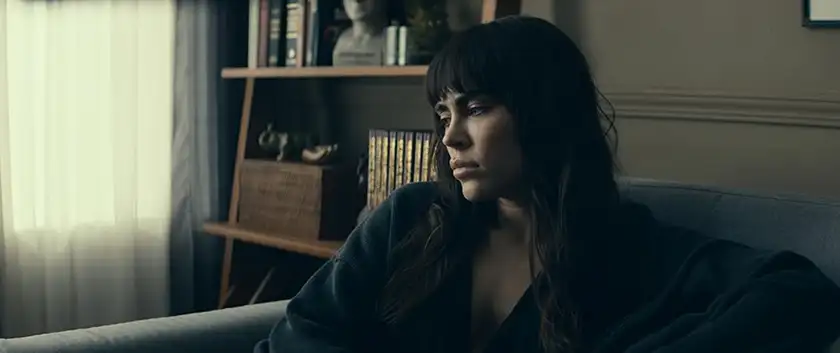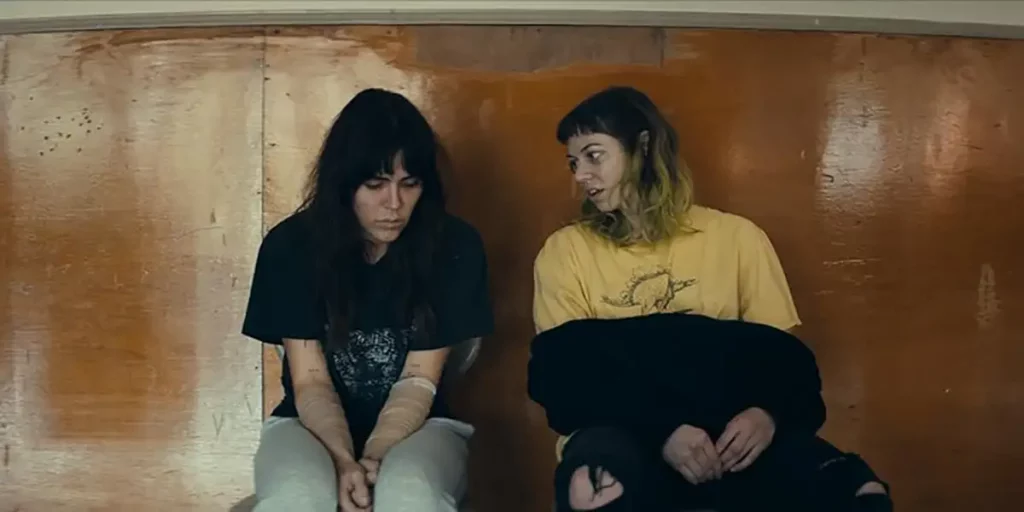Continue is a strong filmmaking achievement that shines a heartfelt and necessary light on Nadine Crocker’s struggles against depression and suicide.
Writer-Director-Producer-Star: Nadine Crocker
Genre: Drama
Run Time: 115′
US Release: September 6, 2024
UK Release: TBA
Where to watch: in US theaters
There are certain films where I feel a certain degree of pressure to be extra careful with how I communicate my thoughts, both on the film and especially on my personal outlook towards its subject matter. No matter how much I love or hate such a movie, I never want to come across like I think I’m an expert who knows exactly how it will resonate with others. Continue, which dives headfirst into the topics of suicide, depression, and mental health, is one of those films.
I’m not going to speak on behalf of anyone who’s fought against or been affected by suicide, but Continue hit me in a really powerful way, and my job here is to explain why I believe it’s one of the most heartfelt and necessary films to come out in a long time.
In Continue, writer/director/producer Nadine Crocker stars as Dean, a woman who suffers from depression and has tried to take her own life on several occasions. After a stay in a mental institution, she’s let back into the world to get her life back on track, finding support in her fellow former patients and even a new love interest (Shiloh Fernandez) as she grapples with the severe inner troubles still standing in her way.
Before starting Continue, I didn’t know that it was based on Nadine Crocker’s real-life experiences. But within ten minutes, I began to strongly suspect it was, solely based on her gut-wrenching performance. Crocker is an acting tour-de-force who brings out the rawest authenticity imaginable, all but eradicating the line between performance and reality. To call it brave would be doing it a disservice, even without the actor’s background in mind. It helps that so much of Continue often allows the visuals and performances do the talking, letting us drink in what everyone is feeling with little to no lines of dialogue.
When dialogue is used, Continue makes it count. Once again, you can pick up on the autobiographical nature of this film without prior knowledge because of how many lines effectively and thoroughly communicate the core nature of what depression can do to someone. The film dives headfirst into why these terrible thoughts are able to linger and persist, why they interfere with the genuinely good things in your life, and how losing someone to suicide can start a chain reaction and spread a cycle of suffering that the victim may have never even considered.

If Continue consisted of nothing but these lines, it may have risked coming across as inaccessible. But a lot of conversations are authentically balanced out with plenty of tangible wit and humor that completes these on-the-page characters’ humanity while going hand-in-hand with their realistic emotions. The romance storyline features great chemistry between Crocker and Fernandez, and their characters’ relationship is upliftingly strong, supportive, and heartfelt without neglecting the many challenges they both have to face given their circumstances.
I can very easily see an alternate version of Continue where its most emotional moments come across as “sappy” or even manipulative, regardless of their true sincerity or intentions. But because the film establishes such raw, multilayered psychological explorations with such a grounded presentation – no doubt helped by their original inspiration – every beat hits. Plus, given how serious and extremely important these themes are, maybe it’s good that the film is sometimes “on-the-nose” with its sentiments. Downright necessary, even.
I’ve never been in nearly as bad a mental state as some of the characters in Continue – though I rode the line many years ago, which I’m not ashamed to admit – I’m sure so many people will watch this movie and get something out of it that they needed to see and hear. Whether they’re survivors like Crocker, have lost someone to suicide, or are struggling to this day to not make attempts on their lives, the nuanced communication of messages in Continue make it potentially one of the most invaluable films to come out in a long time. Again, I have no way of knowing this, and everyone affected by these afflictions is different, but I have a really hard time believing the film won’t mean a lot to people.
The only major part of the story I didn’t quite click with me personally was a sudden low point Dean has at the end of the second act … but it would feel weird to call it a “flaw.” The thing is, the scene in question may very well be totally realistic and even directly based on an actual event, so I would by no means say the film is better off without it. But the way it’s used in the story structure too closely resembles the types of predictable, obligatory third-act crises that more traditional stories have. It’s the only time where Continue felt too much like a standard movie to me. But this isn’t my story, so who am I to say how well it was handled? Plus, the fallout and aftermath are so hauntingly written and acted that it barely matters in the grand scheme of things. I’ll just blame other movies for how I feel here.
Before I had any idea where the film was going, I could tell extremely early on that Continue was going to consistently boast expert-level directing and cinematography. It’s even a bit more visually ambitious than you might expect in places, like when it recaps the traumatic attempt on her life Dean makes that opens the film, where the angles and rapid editing are like something out of a horror movie – I use that comparison to also denote how much of a real-life horror suicide is – and the sequence of events is played with to replicate the feeling of time blurring and all past events coagulating into the nightmare before us.
Nadine Crocker and DP Sy Turnbull continue showcasing their expertise by framing the characters in deliberately isolating and sterile ways while they’re in the mental institution, making great use of expansive negative space, cold colors, and subtle yet effective means of physical separation like two characters just being on opposite sides of an open doorway. But once we’re out of the hospital, the shots become tighter, more intimate, and even a bit shakier, getting across the sense of freedom and personal openness while also keeping the possibility of it all collapsing looming precariously over us.
Overall, Continue is a searing, heartwarming, harsh, and wholly personal drama that delivers an unforgettable display of talents behind and in front of the camera. More importantly, it’s an urgently needed portrayal of the struggles within and around someone and their life-changing battles with one of the worst forms of darkness in existence. Even if you’ve never had your life touched by something like this, you should be very quickly invested in the work done here. If you have been so affected, Continue may be a brutal but ultimately reaffirming beacon of hope that you hold closer to your heart than anyone, myself included, could comprehend.
Oh, and I would be remiss if I didn’t say this: if you ever have thoughts of leaving this world by your own hands, please know that you would be immensely missed and leave a gaping, unfillable hole in so many people’s lives. Even if you don’t know or believe it yourself. I don’t care who you are; you have value. You have reasons to keep going, to continue, and to enjoy the one life you have. It will be a battle, but I promise you it’s a battle worth fighting and winning. So, please reach out for help. Everyone in your life will be grateful … and one day, you’ll be grateful to yourself.
Continue will be released in US theaters on September 6, 2024.

